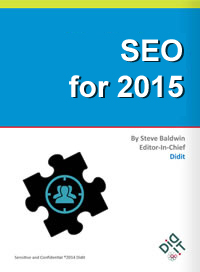
August 6, 2015: Retailers seeking increased market share and an edge on their competitors need to use every weapon in their arsenal to stay ahead. Many of them have learned over the years that PPC is an effective channel for reaching shoppers when they’re close to a purchase decision. PPC is great because it allows retailers to compute ROI on a nearly real time basis, making it easy to justify marketing expenditures to the C-suite. Retailers using advanced segmentation techniques (including dayparting, geo-targeting, and remarketing) can do very well with this proven paid channel.
Because PPC works so well, one can forgive many retailers for ignoring non-paid channels such as SEO and social media. But the smartest retailers know that it isn’t wise to starve non-paid channels, for reasons that include the following:
1. SERP real estate remains scarce. Competition among retailers for both paid and organic real estate on SERPs is incredibly competitive (type a query for virtually any product you can buy on the Web into Google and you’ll see what I mean). Bid prices tend to rise right after Labor Day and will peak just before Christmas. Retailers who can obtain both paid and organic placements on these SERPs will enjoy a crucial competitive advantage, obtaining more traffic, orders, and profit than those who rely solely on paid listings.
 2. SEO-optimized sites make PPC campaigns cheaper. SEO has matured over the years to a point where it’s much more than simply getting attention on SERPs: it’s about making sites usable and accessible throughout the customer experience. Google’s Quality Score provides an incredibly strong incentive for retailers to create user experiences that drive users forward, not toward the back button. Better landing pages and smoother conversion paths make the clicks you buy from Google cheaper. This means you can outbid your competitors for key business-driving terms, resulting in less expensive, more profitable PPC campaigns.
2. SEO-optimized sites make PPC campaigns cheaper. SEO has matured over the years to a point where it’s much more than simply getting attention on SERPs: it’s about making sites usable and accessible throughout the customer experience. Google’s Quality Score provides an incredibly strong incentive for retailers to create user experiences that drive users forward, not toward the back button. Better landing pages and smoother conversion paths make the clicks you buy from Google cheaper. This means you can outbid your competitors for key business-driving terms, resulting in less expensive, more profitable PPC campaigns.
3. Smart SEO differentiates.Too many retailers (especially those selling products from a fixed set of manufacturers) don’t devote enough attention to the actual product pages on the sites they’re driving users to via PPC. Smarter retailers will add meaningful information that lets searchers, shoppers and browsers strongly differentiate their offerings. Improving the experience “beyond the paid click” is something that holistic SEO practitioners do every day.
4. PPC and SEO complement each other. There are many natural efficiencies that result when SEO and PPC efforts are conducted in tandem. The keyword development process — typically one of the most labor-intensive parts of the SEO development cycle — can be leveraged so that it benefits both paid and organic efforts. Similarly, the data returned from PPC campaigns can be leveraged to create better site experiences. The metrics used in PPC and SEO to establish KPIs in both disciplines are virtually identical — only the method of acquisition (whether the click is bought or not) differs. Data from each discipline allows you to put together a complete picture — to “get inside the mind of the searcher” in effect. Once you’ve done this, you can extend these insights outward to other teams, which may include e-mail, social media, PR, or other marketing groups.
Sure, it’s possible to succeed online using paid channels exclusively, in the same way that it’s possible to win a fight with one arm tied behind your back. The question is: why would any rational retailer want to do this?
- 10 Mistakes to Avoid When Using QR Codes for Marketing - September 20, 2023
- Kevin Lee on How AI Changes the SEO Landscape - August 31, 2023
- The Power of Compound Marketing: Kevin Lee Presents @ 1MediaWorld 2023 Global Conference - March 7, 2023
